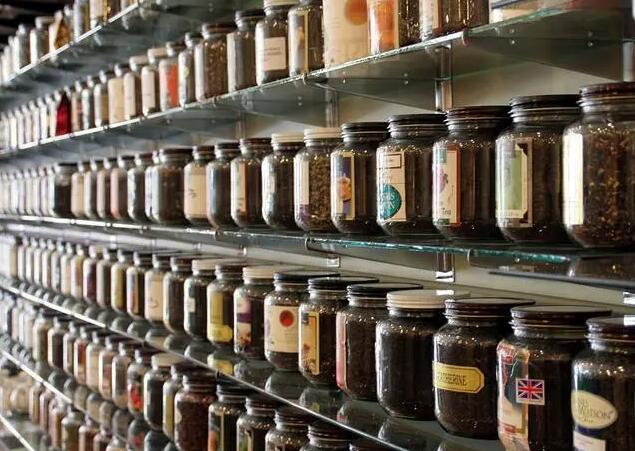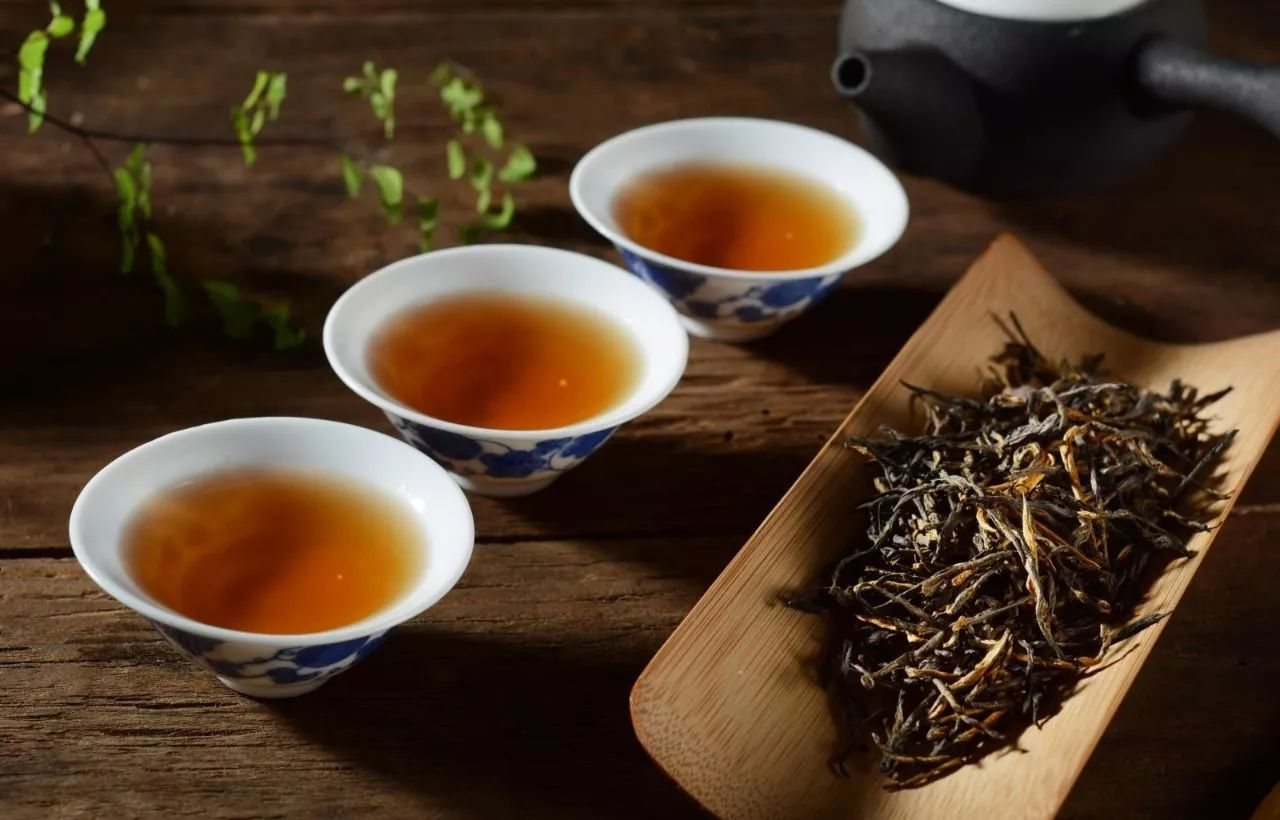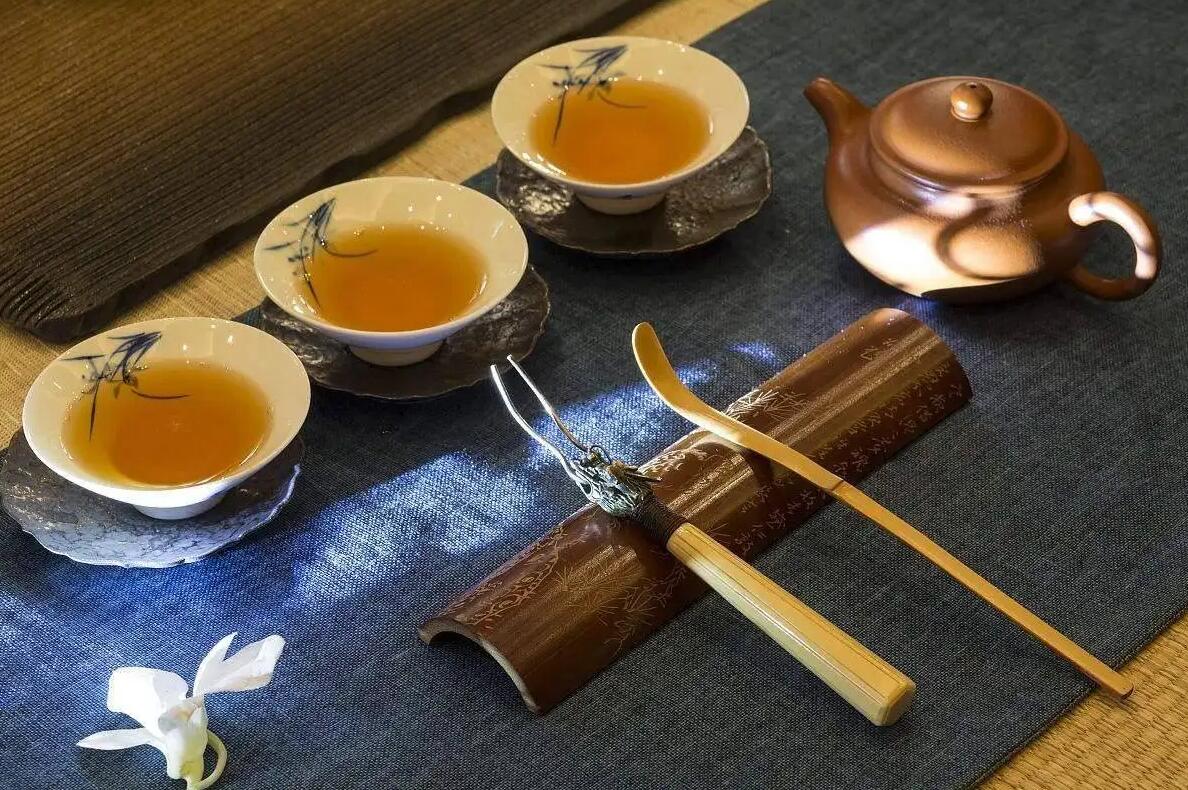A tradition of Buddhist temples in Beijing is to entertain visitors with tea. In imperial times when a provincial official came to the national capital he would often stay in a temple. Buddhist temples pay much attention to the service of tea. Tea ceremony, calligraphy and poetry are three prominent features of Chinese Buddhism.
Visiters to the Minghui Tea Courtyard inside Dajue Temple in the Western Hills can still hear the ever-lasting bells of prayers, see ancient trees and streams fed by mountain springs and smell the delicate tea fragrance.
People in ancient China would select a quiet and pleasant spot in the mountains to practice Buddhism and meditation. They believed such a place might have been visited by immortals. A temple built there complied with the Chinese philosophy of "Heaven and Man are one."Dajue Temple stands amidst beautiful mountains and clear waters.
Behid the front gate of the large temple are seven compounds. one after another. Each compound has solemn halls and pavilions. Among the many floral plants in the compounds are winter jasmine, lilac, yulan magnolia, Chinese rose and winter sweet. A nice aroma of incense lingers in the air. There are also many evergreen plants. The most eye-catching are the several 1,000-year-old cypress trees, still strong and flourishing. Their tranks twist upward toward the sky like coiling dragons. The beholder is inspired by their lofty bearing to elevate the state of their minds. The Yulan Magnolia Compound has the "Magnolia King of Beijing".
The 300-year-old tree has a thick trunk. In blooming season, the whole canopy is heavy with flowers. Magnolia is one of the Buddhist flowers. It enhances the charm and divine air of a Buddhist temple. Drinking tea under a magnolia tree in this ancient compound is a great enjoyment. The
tea drinkers would feel they were living in the "Pure Land".
The best tea at Dajue Temple is "Dragon Well" from West Lake. The tea leaves is steeps in spring water from the temple. It is an extravagance to drink tea made with spiring water in Beijing which is short of water. The spring water from a forest under the state class-A protection brings out all the aroma of the "Dragon Well" tea. Those who have a taste of it can feel the tea fragrance for a long time.
Dajue Temple is located in Haidian District at the wind and water head in Beijing. The district boasts many educational and research institutions. Many of the tea drinkers at the temple are people with good learning. Professors from Beijing University, such as Ji Mulin, Hou Renzhi, Tang Yijie and Le Daiyun,often come to the temple for a cup of tea. The temple is only 20 kilometers from downtown Beijing, or half an hour's drive. It is easy for the city people to get away from the bustling city life. Ji Mulin tells about the filing of those professors by saying: "I had wished I could find a piece of 'Pure Land', a "Land of Peach Blossoms" in the world. Unexpectedly I found such a 'Pure Land' and
' land of Peach Blossoms'. That is Minghui Tea Courtyard founded by Ouyang Xu in Dajue Temple. Every time when I drive from Yanyuan to Dajue Temple the restlessness in my heart diminishes as I am further away from the city. When I have entered the front gate Dajue Temple all the restlessness in me is gone. Here I see ancient pine and cypress trees, lilac, wisteria, pear blossoms, Chinese redbud, and especially my favorite magnolia and Beijing mock orange. All seem to greet me with respect. The squirrels on the roofs smile at me. I remember a couplet I wrote not long ago, which reads: 'Squirrels jump freely on the roof,/The compound is filled with Beijing mock orange flowers'. They make me feel carefree and happy. Those ancients who lived at the 'Source of Peach Blossoms' would have envied me."
Among the earliest scholars who drank tea at Dajue Temple were two great German Sinologists, Otto Frank and his son Wolfgang. When they came to Beijing fifty years ago they fell in love with the Western Hills. They believed the assertion of Confucius that "The benevolent love mountains and the wise love water." They explored the mountains and rivers in search of the Chinese traditional culture. When they stayed in Beijing they often went to Dajue Temple. High monks in the temple would entertain them with tea and discuss with them about Buddhism and culture.
Dajue Temple has no monks now. It is looked after by people from the Beijing Bureau of Religious Affairs. But the tea ceremony at the Minghui Tea Courtyard still begins with Buddhist music and the music is played through the tea ceremony that lasts over a dozen minutes.
As the deep and transcendent music starts, the compound where the Minghui Tea Courtyard is located immediately becomes quiet. People hear only the low-toned beautiful music reverberating around the hall eaves, corridors and pine and cypress trees. The mood of the tea drinkers becomes quiet and solemn too.
Then three pretty girls dressed up as Buddhist nuns with the hair bun on the top of their heads walk out of the front hall, holding plates with the tea cups on them. One girl sits down on the chair behind the desk and two girls stand beside the seated girl with tea cup in hand. Their posture is so graceful many tea drinkers imitate it involuntarily.
The seated girl in dark blue robe begins to perform the tea ceremony step by step: washing the cup, rinsing the teapot, potting tea leaves in the teapot and steeping the tea leaves. As said before the procedures of the tea ceremony has been introduced from south China. But these procedures here are executed by a pretty girl with a steady mood and accompanied by the profound Buddhist music. The tea ceremony becomes a display of an ancient form of art that transcends time and space.
When the music comes to the end and the tea drinkers are still savoring it, the three girls come down the steps to present a cup of tea to the six distinguished guests seated on the first row. On behalf of the tea drinkers the six people accept the tea with both hands and finish it off with one gulp. Other tea drinkers cheer by clapping their hands. The three girls then retreat into the front hall. The tea ceremony is over.
Then young waitresses in blue traditional jackets and long skirts deliver tea and refreshments to each table. The tea drinkers can see spring water flow through a bamboo pipe from the mountains. They sip at the tea with an intoxicating feel.
The Minghui Tea Courtyard serves almost all the varieties of tea: green tea, black jasmine tea and rock tea. The tea drinker orders the tea and refreshments to his like. The price ranges from 200 yuan to 1,000 yuan a person.
The traditional tea varieties the Minghui Tea Courtyard serves are "Dragcm Well" from Shifeng Peak by West Lake and "Spring Green Snail" from Dongting Mountain by Taihu Lake. Veteran tea drinkers claim the tea leaves of the "Dragon Well" and "Spring Green Snail" steeped in mountain spring water of Dajue Temple is a matchless concoction.
In every March the Minghui Tea Courtyard sends people to Shifeng Mountain by West Lake in Zhejiang Province to buy newly picked "Dragon Weir tea leaves and then go to Taihu Lake and reach Dongting Mountain in the lake by boat to buy newly picked "Spring Green Snail" tea leaves there.
The popular way to make green tea in Beijing today is to steep the tea leaves in a glass. The drinker can admire the tea through the transparent glass. Pretty waitresses put some "Dragon Well" tea leaves into the glass and pour in hot mountain spring water. The green leaves start to uncart and swirl in the hot water. Wisps of pleasant aroma rise from the glass. Tea drinkers can now savor the first draw of the tea, which tastes a bit bitter and gives off a light yet rich fragrance. The bitter taste disappears in the second draw and the tea has a pure taste. The fragrance in the third draw is lighter but the taste becomes enduring. The tea will its fine aroma after the third draw, good enough only for quenching thirst Many people like to chit chat over a cup of tea, whiling away the time in laughter. This is a long tradition.
The "Spring Green Snail" tea leaves are shaped like light white balls. The tea making at the Minghui Tea Courtyard is to pour hot water into the yixing teacup first and then put the tea leaves in the cup. A waitress drops the tea leaves quickly into the transparent glass filled with hot water. The tea leaves sink and rise in the water like "sprays of snowflakes or flying pearls". The color is not the usual pure green but has a tint of There is a restaurant of Shaoxing cuisine next to the Minghui Tea Courtyard in the southern compound of Dajue Temple. Its reserved dishes include "Fish Curd", "Dongbo Pock", "Beans Flavored with Aniseed" and "Crab Powder Lion Head'' Tea drinker like to have a meal there. The restaurant also serves dishes with tea leaves as an ingredient, such as the refreshing, light-taste "Fish Slices Cooked with Tea Leaves". They are much loved.
The temple runs a hotel too, even with a presidential suite. Some of the distinguished tea drinkers from political, business and cultural circles are so fascinated with the scenery they want to stay in title hotel overnight.
That the Minghui Tea Courtyard is famous is because its owner Ouyang Xu, a graduate of the Chinese Department of Beijing University. He is the founder of "Guolinfeng", one of the three most famous private bookstores in Beijing, along with "Wansheng" and "Fengrusong" , in terms of the size and quality of books.
Buddhism stresses on preordained fate and lucky chance. A lucky chance made it possible for Ouyang Xu to set up the Minghui Tea Courtyard. Eight years ago, he and several of his friends went on a sight-seeing tour in the mountain area in northwestern part of Haidian District. Although Beijing has a huge area, the best scenic sights, such as Fenghuangling Mountain, Jiufeng Peak, Yangtai Mountain and Dajue Temple are all in this mountain area. At dusk they lost the direction. They came upon a temple by chance. Exhausted and hungry they decided to spend the night in it. The monks received them warmly and gave them a tour of the temple. After the meal, Ouyang Xu talked with the monks. Suddenly an idea came to his mind: he would open a teahouse in the temple that was built in the Liao Dynasty 1,000 years ago. He had been moved by the atmosphere in the Buddhist temple. He told the monks about his idea and they accepted it readily. Soon the Minghui Tea Courtyard was set up. Ouyang Xu, a man who has a predestined relationship with Buddha, became the founder of the most famous Buddhist temple teahouse.



